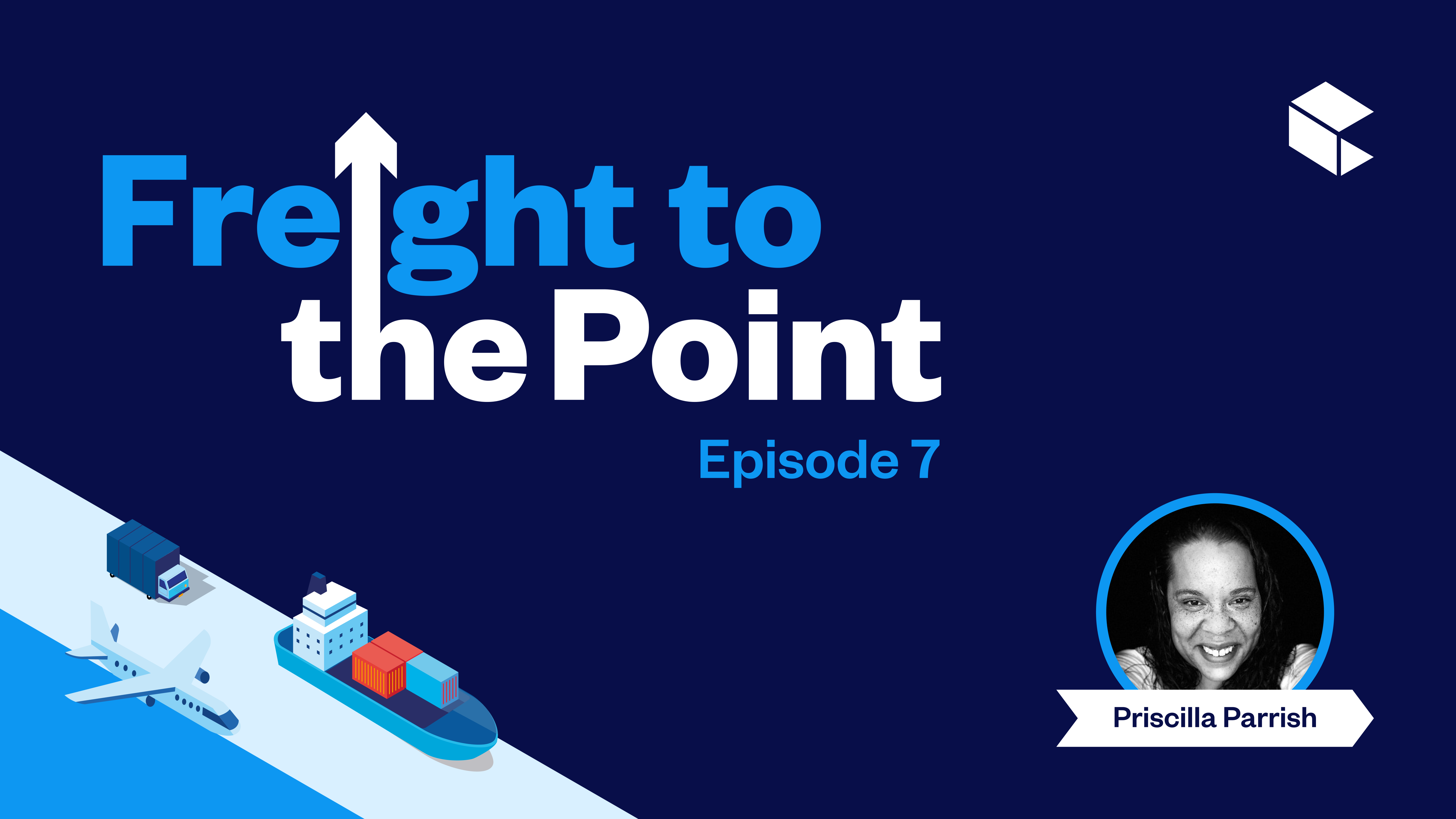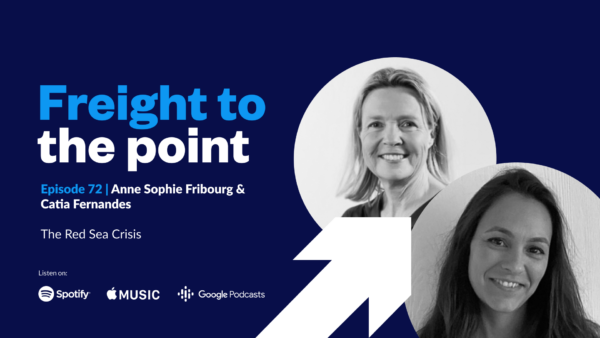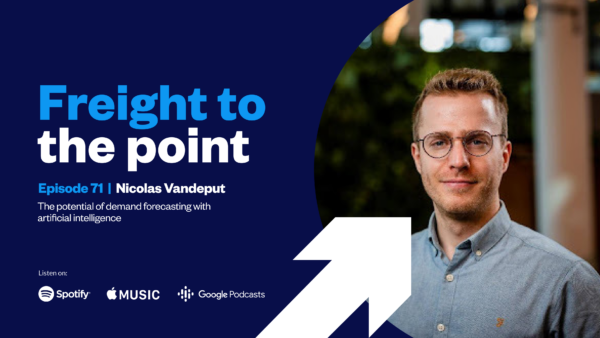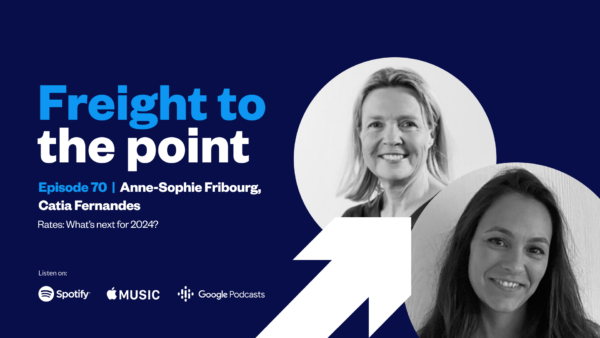Episode 7:
Problem solving through data solutions with Priscilla Parrish
See all episodes

How do you solve supply chain problems, when you can’t see what’s going on? Priscilla Parrish, Head of Logistics at Velocity Commerce explains the challenges she has faced and how she has solved problems through data.
We discuss:
- How data drives confidence in decision making
- Influencing senior management to adopt improved data and tech in the supply chain
- Reducing human error through API connections and data streams
Resources
- Microsoft Excel video – https://www.youtube.com/watch?v=kOO31qFmi9A
Priscilla Parrish
With a focus on international trade, B2C, B2B, and Amazon, Priscilla is extensively experienced in increasing efficiencies and cutting costs in retail supply chains by managing 3PL partners across the globe using data-driven solutions.
Listen to the next episode now
 Hello, and welcome to episode seven of Freight to the Point, a podcast by Zencargo. I’m Helena Wood, and today I am joined by Priscilla Parrish, the Head of Logistics at Velocity Commerce. We’re so thrilled to have Priscilla with us. You guys might be familiar with her because she joined us at Navigate back in April, where we talked about how businesses can build a smarter supply chain for the future. Today, we’re going to be covering more about Priscilla’s insights on data, the role of data automation, and some of her ship happens moments. Welcome, Priscilla.
Hello, and welcome to episode seven of Freight to the Point, a podcast by Zencargo. I’m Helena Wood, and today I am joined by Priscilla Parrish, the Head of Logistics at Velocity Commerce. We’re so thrilled to have Priscilla with us. You guys might be familiar with her because she joined us at Navigate back in April, where we talked about how businesses can build a smarter supply chain for the future. Today, we’re going to be covering more about Priscilla’s insights on data, the role of data automation, and some of her ship happens moments. Welcome, Priscilla.

 We are so excited to have you here. We always love a conversation with you, Priscilla. They’re always full of ups and exciting anecdotes. Super, super thrilled. But let’s get freight to the point. Tell me, why logistics? How was it that you started out in supply chain?
We are so excited to have you here. We always love a conversation with you, Priscilla. They’re always full of ups and exciting anecdotes. Super, super thrilled. But let’s get freight to the point. Tell me, why logistics? How was it that you started out in supply chain?
I think it’s interesting. Most of the people I know who are in supply chain don’t necessarily have a very large background in supply chain. Ship happens. You just kind of thrust into it. You’re recognised for having this analytical logistics type of brain. It was very much the same for me. I have a heavy background in operations. I worked at Mountain Warehouse. I was hired as their Operations Assistant, and I was tasked with just making sure that all of the stores had all of their non-stock supplies. That was my first taste of logistics. I was in charge of then opening all of the stores across the world, not just in the UK, but literally across the globe. And so, making sure all of the things happened for that and the background of that.

 Which makes so much sense, and I think, really interesting to hear about coming into the world of logistics, maybe accidentally is not quite right, but as you increase your exposure to just how, yes, complex, sophisticated, interesting, curious, the whole world of logistics and supply chain is, I can imagine for lots of us and for anyone whose brain ticks around anything to do with patterns and problem solving, it’s just this kind of treasure chest of challenges and problems to solve that you can keep going through. It’s really exciting, actually.
Which makes so much sense, and I think, really interesting to hear about coming into the world of logistics, maybe accidentally is not quite right, but as you increase your exposure to just how, yes, complex, sophisticated, interesting, curious, the whole world of logistics and supply chain is, I can imagine for lots of us and for anyone whose brain ticks around anything to do with patterns and problem solving, it’s just this kind of treasure chest of challenges and problems to solve that you can keep going through. It’s really exciting, actually.

 Amazing. So obviously, you’ve stayed in logistics. You’ve spoken a bit about data. You’ve spoken a bit about problem solving. I suppose, what is it that’s made it your true love and the kind of path that you’ve kept your career moving in?
Amazing. So obviously, you’ve stayed in logistics. You’ve spoken a bit about data. You’ve spoken a bit about problem solving. I suppose, what is it that’s made it your true love and the kind of path that you’ve kept your career moving in?

 Amazing. I think something you spoke about when we had Navigate was not only the problem solving, but actually starting to see the reach of the impact of your problem solving within the business, which probably has been true in the last couple of years than ever before.
Amazing. I think something you spoke about when we had Navigate was not only the problem solving, but actually starting to see the reach of the impact of your problem solving within the business, which probably has been true in the last couple of years than ever before.

 Perfect. I’m thinking, I wonder if there’s anyone listening to the podcast who might be considering a career in supply chain or wanting to become a logistics expert, and you’re saying, fixers and problem solvers. They’re going to be able to geek out on fixing any of these problems.
Perfect. I’m thinking, I wonder if there’s anyone listening to the podcast who might be considering a career in supply chain or wanting to become a logistics expert, and you’re saying, fixers and problem solvers. They’re going to be able to geek out on fixing any of these problems.

 Well, you’re veering us into, I know you’re sort of pet topic. The one you love talking about, which is all around data, isn’t it? When we had our Navigate session, we spoke about data. Tell me, what is it about data that you love?
Well, you’re veering us into, I know you’re sort of pet topic. The one you love talking about, which is all around data, isn’t it? When we had our Navigate session, we spoke about data. Tell me, what is it about data that you love?

 Which is interesting. So I suppose, is there an implication in what you’re saying that in possibly supply chains that are not data rich, or maybe the old world of doing supply chain, people were making subjective decisions that came with probably greater risk.
Which is interesting. So I suppose, is there an implication in what you’re saying that in possibly supply chains that are not data rich, or maybe the old world of doing supply chain, people were making subjective decisions that came with probably greater risk.
Yeah, exactly. It’s the thing of when you have that clean, solid data, it’s really easy to do those things. But it’s harder to do it when you’re in a singular environment. When it’s just you looking at this. And so, when you have that data set and you have that sort of clean, perfect data, you know that you’re making the right decision. It’s hard to veer from that once you get a taste of it, once you get a taste of this is what’s right and moving into some place where, the data’s all over the place and you have some here, someone else’s hard drive, it’s fragmented across the business and unifying that, you can see the fruits of that labour. You can see sort of what the knock on impact is and what can be done when you have something that’s shareable across different departments, even.

 Which is super interesting. You did speak about those different, I think you were talking about, it was almost like different camera lenses and everyone was zooming in on the data in a slightly different scope and with a slightly different lens. But of course, the dependency was that the data was consistent, the data was accurate, so that what everyone was approaching it, they were able to do that.
Which is super interesting. You did speak about those different, I think you were talking about, it was almost like different camera lenses and everyone was zooming in on the data in a slightly different scope and with a slightly different lens. But of course, the dependency was that the data was consistent, the data was accurate, so that what everyone was approaching it, they were able to do that.

 Which is really interesting because I imagine even though it might sound obvious all of your departments got together and spoke about your shared needs, it’s so easy for all of us to end up in little silos, in little areas of our own. So even the fact that you were able to use sort of, I suppose, data as almost like the single common language to bring functions together, I think is so great to hear.
Which is really interesting because I imagine even though it might sound obvious all of your departments got together and spoke about your shared needs, it’s so easy for all of us to end up in little silos, in little areas of our own. So even the fact that you were able to use sort of, I suppose, data as almost like the single common language to bring functions together, I think is so great to hear.

 Priscilla, it’s really interesting to hear. Obviously the way that you guys are doing things at Velocity Commerce is, I hope you don’t mind me saying, it’s quite an evolved and advanced supply chain. You’re using data, you’re working collaboratively across the business. I imagine, even within the scope of your own experience over the last few years, you must have seen a real change between the old way of doing things versus how you’re doing things now. So, what’s that transition looked like?
Priscilla, it’s really interesting to hear. Obviously the way that you guys are doing things at Velocity Commerce is, I hope you don’t mind me saying, it’s quite an evolved and advanced supply chain. You’re using data, you’re working collaboratively across the business. I imagine, even within the scope of your own experience over the last few years, you must have seen a real change between the old way of doing things versus how you’re doing things now. So, what’s that transition looked like?
Very much so. Just even looking back three years ago from the way that things worked to the way that we’re working now, it’s very much, we’re more reliant on a more agile system. I’m more reliant on being able to be flexible depending on the shifts in the market. With COVID and the pandemic it’s been really difficult to judge, like, are these COVID sales or are these just regular sales? Is the increase due to COVID and everyone being locked down and nothing to do except buy stuff on the internet? Or is it actually tangible sales and organic growth?

 Which is great. I know we’ve spoken before about Excel. You had some interesting personal experience of seeing just the kind of the opportunity cost and the impact of a slow and broken process using Excel. You spoke before about things like human error. Can you tell us a bit more about what that looks like for businesses that are dependent on those old, old ways of working?
Which is great. I know we’ve spoken before about Excel. You had some interesting personal experience of seeing just the kind of the opportunity cost and the impact of a slow and broken process using Excel. You spoke before about things like human error. Can you tell us a bit more about what that looks like for businesses that are dependent on those old, old ways of working?
It’s really funny that this morning even scrolling through YouTube as I do in the morning with my coffee, I was suggested a link to an advert for Excel from 1992. It blew my mind. It was the first release of Excel. This advert for it is just hilarious. With the wonderful things you can do. It was great 30 years ago. You can auto some things. It was great 15 years ago.
 |
 It’s super interesting. I’d love to see that advert. I think I might get onto YouTube myself and see if I can find it.
It’s super interesting. I’d love to see that advert. I think I might get onto YouTube myself and see if I can find it.

 Sounds great. But it’s interesting because you were talking so much about the potential of having improved data leading to automation and what that can mean for a supply chain in a business. But I think there are lots of people who might listen to a podcast like this who work in supply chain, maybe a business that’s not felt ready to take that step, or that sees a list of reasons not to change the way they’re managing data and processes. What is your stance on the sort of adoption of improved data and tech within supply chain?
Sounds great. But it’s interesting because you were talking so much about the potential of having improved data leading to automation and what that can mean for a supply chain in a business. But I think there are lots of people who might listen to a podcast like this who work in supply chain, maybe a business that’s not felt ready to take that step, or that sees a list of reasons not to change the way they’re managing data and processes. What is your stance on the sort of adoption of improved data and tech within supply chain?
It’s all, again, change management. It almost feels like you have to persuade the top and then work your way down. If you persuade the stakeholders and you get them on board, then it’s usually a lot easier to enact that change, to push it through. You’re always going to have the stragglers who are set in their ways. You’re always going to have those people and it’s okay. I am very much a person who doesn’t enjoy change, believe it or not. I don’t enjoy it. But if I can see the benefit of it, if I can be shown, again, an analytical solution, that makes sense and you can prove that to me, I’m a lot easier to persuade to adopt.

 There’s some really practical advice in there though, isn’t there? Which is for anyone that’s maybe thinking how to make that case, follow the money, be brave, talk to the leadership and to your key stakeholders and use that data to demonstrate potential.
There’s some really practical advice in there though, isn’t there? Which is for anyone that’s maybe thinking how to make that case, follow the money, be brave, talk to the leadership and to your key stakeholders and use that data to demonstrate potential.

 Amazing. Now obviously, I’m a convert to the Priscilla way of thinking. I’m sure lots of people who are listening to this are converts too, but you’ve had such an interesting career. I’d love to hear Priscilla. You said yourself, you’ve had ups and downs, you’ve seen failures, you’ve seen challenges, and that’s something we talk about a lot. Ship happens. So can you tell us, what’s the story that you tell your friends at a dinner party about when ship has happened in your supply chain career?
Amazing. Now obviously, I’m a convert to the Priscilla way of thinking. I’m sure lots of people who are listening to this are converts too, but you’ve had such an interesting career. I’d love to hear Priscilla. You said yourself, you’ve had ups and downs, you’ve seen failures, you’ve seen challenges, and that’s something we talk about a lot. Ship happens. So can you tell us, what’s the story that you tell your friends at a dinner party about when ship has happened in your supply chain career?
Oh, there are so many things ship happening. When I was with my former company, this is when I had a real handle on opening stores. I could open four or five stores per week across the world and different time zones. It wasn’t a piece of cake, but there was a system, there was a process, everything went to plan. They were opening a new brand. We were opening it in North America. We already opened a few stores in the UK and they had a whole different logo branding, everything. So they needed a whole new, different set of bags, tickets, stickers, all of the consumables non-stock things, and I was in charge of that. Ordered these hangers from China three, four months ahead, gave myself a good buffer. Always give yourself a good buffer. Never, never work to that really tight dial. Always give yourself a buffer.
So I had a buffer and everything was supposed to be in line for these hangers to arrive. Import and then be distributed to the stores with two or three days to spare. Perfect. Priscilla plan was working well. We followed the tracking of the containers as much as we could at the time. And when the container that we thought our hangers were on arrived in port, showed up to the warehouse, there are no hangers on it. There was all the other stuff that we needed. But the most important thing in any clothes shop is hangers where you can’t just display clothes on just on the floor.
So, it was a big problem. And because we couldn’t use our sister brand or the parent brand company hangers, because it’s completely different brand, we were in a bind. We had a total of, I think it was four days, to get, produce hangers from nowhere, and get them to, it was two stores at the time, to two stores across the country from each other. There was a lot of swearing, there was a lot of anger, and it was because there was no visibility. We were told that the supplier did this. We took their word for it. We had no manifest. We had no information other than here’s your container number.
It was probably one of the most stressful weeks of my life. I’m not even going to lie. That week was, it was very hard. But we managed to pull it through in the end by calling several different companies and just getting plain hangers. Then we figured out that we could get the logo off of the old hangers. We just rubbed it off with some nail polish remover. Perfect. Then, there was a deep discount on hangers for the next year because of this. But that was probably the worst week I’ve ever had.

 Who would have thought?
Who would have thought?

 Well, testament to how important visibility is and how important being able to follow that data. But I never thought that clothes hangers could have cost so much stress.
Well, testament to how important visibility is and how important being able to follow that data. But I never thought that clothes hangers could have cost so much stress.

 That’s a good point though. You can’t open a shop unless you’ve got something to hang the clothes on.
That’s a good point though. You can’t open a shop unless you’ve got something to hang the clothes on.

 I’m going to catch you out though, because this was meant to be a ship happens moment, but you really overcame that. You sorted out, you solved the problem, the Priscilla way persisted. Has there ever been a ship happens moment that you’ve not been able to turn around?
I’m going to catch you out though, because this was meant to be a ship happens moment, but you really overcame that. You sorted out, you solved the problem, the Priscilla way persisted. Has there ever been a ship happens moment that you’ve not been able to turn around?

 You’ve told me about the many hats that you have to wear in your career. I’m imagining you got your Inspector Poirot detective hat for a case like that.
You’ve told me about the many hats that you have to wear in your career. I’m imagining you got your Inspector Poirot detective hat for a case like that.

 Love it. I love a dynamic duo. Priscilla, as we come towards the end of our podcast, I’d love to hear from you what you envisage or think of as the future of the industry. Is there anywhere that you would like to see change in the supply chain space?
Love it. I love a dynamic duo. Priscilla, as we come towards the end of our podcast, I’d love to hear from you what you envisage or think of as the future of the industry. Is there anywhere that you would like to see change in the supply chain space?
This is going to sound like a plug for Zencargo, but after adopting the Zencargo, and sharing my vision with Zencargo, and seeing how much it aligned, what the extrapolation of sort of the visibility that I’ve gained and the accountability that they have been able to provide me for my suppliers, the next step for me is tightening up that chain and going digital. I want everything digital. No offense to the lovely people at Zencargo, but I want less contact with you as much as possible. Unless there’s a problem, unless there’s a fire, unless there’s something that absolutely needs my attention right then and there, I would love to see things happen in a very automated way.
I was part of automation and implementing automation in my last warehouse and seeing robots and seeing those types of things and building business cases for that. For me, that’s the core to my job, is making sure that we enable the rest of the business to go forward without costing more and being more agile. I would love to see more companies doing those things.

 Such a true point. I feel like I probably also need to throw in an official disclaimer that we didn’t put too much pressure on you to call out Zencargo.
Such a true point. I feel like I probably also need to throw in an official disclaimer that we didn’t put too much pressure on you to call out Zencargo.
There are two people I will call out and they’re both going to really hate me for this: Karen Donovan and Jess Mays. I am proud enough to call them my friends. But also they’ve both helped me in my logistics career. It’s always great to have that sounding board with someone who isn’t … Logistics is really a niche career in a way that you can explain what you do and people still don’t understand it. I mean, now they do with the pandemic and supply chain being blamed for everything. Well, the shortages of everything. But having someone who you can speak to and they understand the struggles, they’ve been there, they’ve done that, and they can give you advice on it, that’s been a great help, especially transitioning from operations into logistics. It seems like it’s sort of a good fit, but there are this way of thinking, this is how it should be operationally. You have to tweak it for logistics because it’s not the same. It’s different. Those two people are probably high up on the list of people I’d like to thank.
 |
 Thanks for calling them out. It’s great that obviously that mentorship has turned into into friendship. It’s the best end point. We’ve got one more thing to do Priscilla, and you knew it was coming. It’s time for our quickfire question round.
Thanks for calling them out. It’s great that obviously that mentorship has turned into into friendship. It’s the best end point. We’ve got one more thing to do Priscilla, and you knew it was coming. It’s time for our quickfire question round.

 It’s edge of your seat stuff. I hope you’re ready.
It’s edge of your seat stuff. I hope you’re ready.

 Let’s get started. First question for you, Priscilla is, would you rather at this moment in time, focus on making your supply chain agile or resilient?
Let’s get started. First question for you, Priscilla is, would you rather at this moment in time, focus on making your supply chain agile or resilient?
Resilient.
 |
 Perfect. Can you sum up the supply chain market in three words?
Perfect. Can you sum up the supply chain market in three words?

 Great best career advice you’ve ever received?
Great best career advice you’ve ever received?
Always follow the money.
 |
 What is the number one lesson that working in supply chain has taught you?
What is the number one lesson that working in supply chain has taught you?

 We love that Priscilla. I knew we were going to have a good time. Thank you so much. It’s always a pleasure speaking with you.
We love that Priscilla. I knew we were going to have a good time. Thank you so much. It’s always a pleasure speaking with you.

 And a huge thank you also to our audience for tuning into this episode. If anyone has any questions or any feedback, please do contact me or Zencargo on LinkedIn. Thank you everyone and until next week, goodbye.
And a huge thank you also to our audience for tuning into this episode. If anyone has any questions or any feedback, please do contact me or Zencargo on LinkedIn. Thank you everyone and until next week, goodbye.

Episode 72: The Red Sea Crisis
In the latest episode of Freight to the Point, we’ve featured our most rec...

Episode 71: The potential of demand forecasting with artificial intelligence
In the most recent instalment of Freight to the Point, Lucie Phillips, Zen...

Episode 70: Rates: What's next for 2024?
As we prepare for the year ahead, it's crucial to consider the three pillars...

